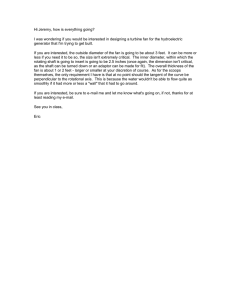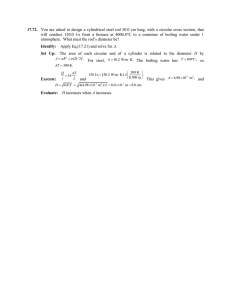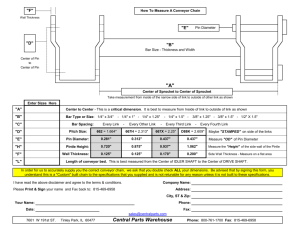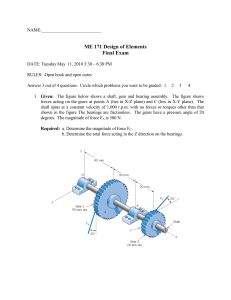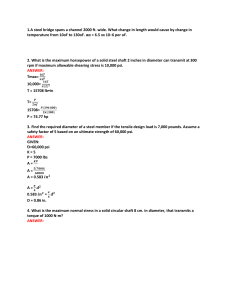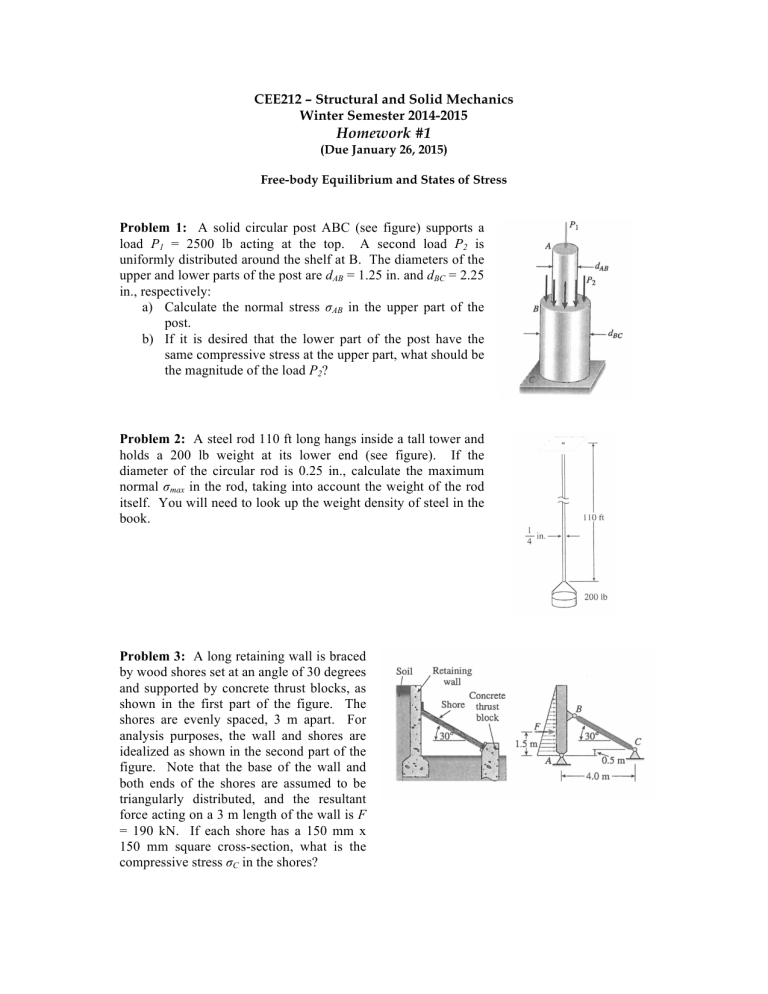
CEE212 – Structural and Solid Mechanics Winter Semester 2014-2015 Homework #1 (Due January 26, 2015) Free-body Equilibrium and States of Stress Problem 1: A solid circular post ABC (see figure) supports a load P1 = 2500 lb acting at the top. A second load P2 is uniformly distributed around the shelf at B. The diameters of the upper and lower parts of the post are dAB = 1.25 in. and dBC = 2.25 in., respectively: a) Calculate the normal stress σAB in the upper part of the post. b) If it is desired that the lower part of the post have the same compressive stress at the upper part, what should be the magnitude of the load P2? Problem 2: A steel rod 110 ft long hangs inside a tall tower and holds a 200 lb weight at its lower end (see figure). If the diameter of the circular rod is 0.25 in., calculate the maximum normal σmax in the rod, taking into account the weight of the rod itself. You will need to look up the weight density of steel in the book. Problem 3: A long retaining wall is braced by wood shores set at an angle of 30 degrees and supported by concrete thrust blocks, as shown in the first part of the figure. The shores are evenly spaced, 3 m apart. For analysis purposes, the wall and shores are idealized as shown in the second part of the figure. Note that the base of the wall and both ends of the shores are assumed to be triangularly distributed, and the resultant force acting on a 3 m length of the wall is F = 190 kN. If each shore has a 150 mm x 150 mm square cross-section, what is the compressive stress σC in the shores? Problem 4: An angle bracket having thickness t = 0.5 in. is attached to the flange of a column by two 5/8-in. diameter bolts (see figure). A uniformly distributed load acts on the top face of the bracket with a pressure p = 300 psi. The top face of the bracket has length L = 6 in. and width b = 2.5 in. Determine the average bearing pressure σb between the angle bracket and the bolts and the average shear stress τavg in the bolts. You can disregard friction between the bracket and the column. Problem 5: A specially designed wrench is used to twist a circular shaft by mean of a square key that fits into slots (or keyways) in the shaft and wrench, as shown in the figure. The shaft has diameter, d, the key has a square cross section of dimensions b x b and length of the key is c. The key fits half into the wrench and half into the shaft (i.e., the keyways have a depth equal to b/2). Derive a formula for the average shear stress τavg in the key when a load P is applied at distance L from the center of the shaft. You can disregard the effects of friction. Also, assume the bearing pressure between the key and the wrench is uniformly distributed, and be sure to draw a free-body diagrams of the wrench and key. Problem 6: A steel pad supporting heavy machinery rests on four short, hollow, cast iron piers (see figure). The ultimate strength of the cast iron in compression is 50 ksi. The outer diameter of the piers is d = 4.5 in. and the wall thickness is t = 0.40 in. Using a factor of safety of 3.5 with respect to the ultimate strength, determine the total load P that may be support by the pad. Problem 7: A ship’s spar is attached at the base of a mast by a pin connection (see figure). The spar is a steel tube of outer diameter d2 = 80 mm and inner diameter d1 = 70 mm. The steel pin has diameter d = 25 mm and the two plates connecting the spar to the pin have thickness t = 12 mm. The allowable stresses are as follows: compressive stress in the spar, 70 MPa; shear stress in the pin, 45 MPa; and bearing stress between the pin and the connecting plates, 110 MPa. Determine the allowable compressive force Pallow in the spar.
